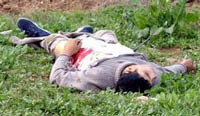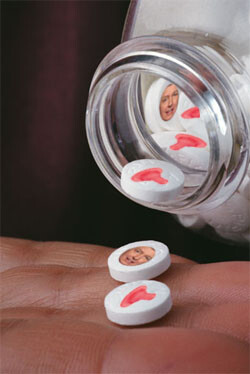16 January 2003

Above: A dead Palestinian. Most professional news organisations feel that dead Palestinians are all too common to be front page news. In a recent BNN exit interview with departing CNN CEO Waldo Issacsin, Issacsin noted that Palestinians should try to concentrate on dying less frequently so that news organisations see it as more of a big deal, or else try to be killed by other Arabs, which is always newsworthy. (BNN)
“We at the Campaign to Monitor the Media feel that the deaths of Palestinians means something,” said Al-Muharrad, who made the shocking declaration to stunned silence from the members of the media present.
“It’s not acceptable,” exclaimed Jonathan Bonce of the New York Times. “We came out here to watch some Arab from some Arab organisation squirm as we put them on the spot with some vague unsupported needling questions about where their funds come from, and we are greeted with this extremist propaganda.”
“Any reader of the New York Times will be aware that we print all the news that’s fit to print,” stated Bonce, “and it’s abundently apparent from the cursory attention we give to the Palestinians that there’s something not newsworthy about their deaths. If it’s Israelis killing them, and we all know that Israel only kills civilians and children by mistake, why bother our readers with it?”
Others present disagreed. “I’ve never really thought about it,” commented Sally Sharmalta-Smyth, from the New York Post. “I guess I don’t have time to worry about it, with all the reading I do on the subject of materials sent to me by the Campaign Against More Emphasis on Rubbed-out Arabs (CAMERA).
NPR Middle East editor Paul D. Heck was forthright about what he saw as primarily an issue of geographical clarity: “It is my firm belief that our news audience is interested primarily in events that occur near where our reporters live in Jerusalem, Israel. We don’t want to complicate things by having to explain the political differences between Israel and the occupied territories, and it’s much simpler if we build a reporting picture over time that stays within as memorable a georgraphic area as possible.”
When asked if he thought this limited the news, Heck responded: “Of course not. We at NPR trust that the important news on the Israeli-Palestinian Conflict mostly happens within a mile radius of wherever Linda Gradstein happens to be, so we don’t really encounter this problem. In any case, everyone thinks our reporting is a pile of shit, and we did think long and hard about this until we realised that this means that we must be doing it right.”

Above: The government-issued 24-hour memory delete pills are an important tool in the War Against Terrorism and a sign that the Bush administration is forthrightly combatting evil at its root: naughty thoughts. (BNN)
In related news, at a private party in Uscut, Indiana, regular Common Dreams reader Nancy Contrell had only just made an off-hand comment — “How awful it was that so many Palestinians die each month!” — to what had seemed to be merely another party goer, when black helicopters and men in airtight silver suits swarmed in on the location and issued all guests with 24-hour memory delete pills (pictured right), the ones with the design of John Ashcroft on one side and a pink titty on the other.
One party guest, who had been speaking on a cell phone prior to taking the government-issued pill, noted that very few people had heard the comment or cared that much, but was grateful that the government had bothered to ensure that noone was confused by Contrell’s thoughtless remarks.